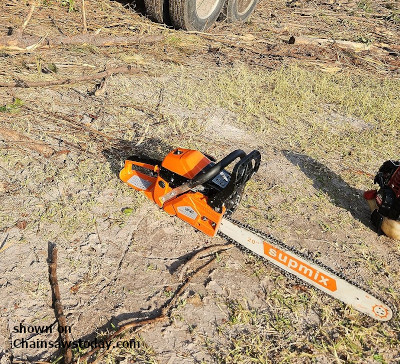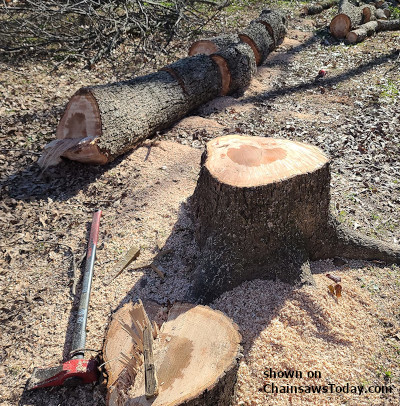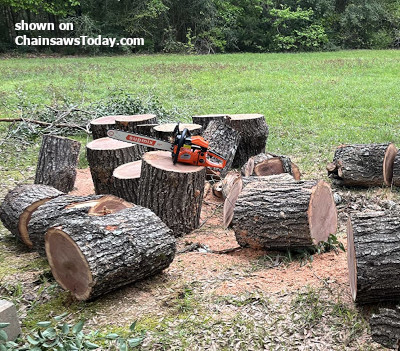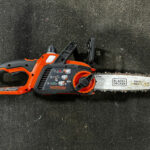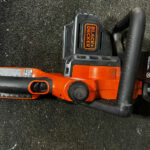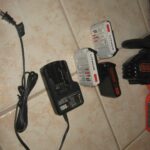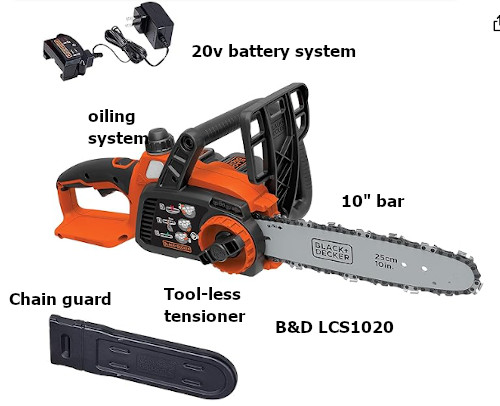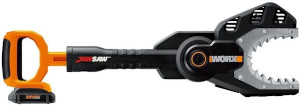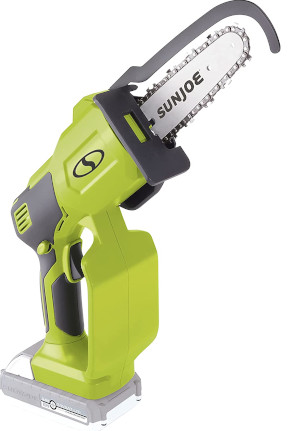With a great balance between raw power and ease of handling, the DEWALT DCCS670X1 chainsaw is designed with homeowners in mind. It’s ergonomic and quite efficient, so it’s ideal for cutting needs around the yard and house. No, it’s not a pro saw, but it’s suitable for the majority of folks in the market.
In this article, I’ll cover a broad range of topics, including what I think about this saw, general info about Dewalt’s Flexvolt system, and how the DCCS670X1 stacks up against the competition.
DEWALT FLEXVOLT 60V Tools
DeWalt’s 60V FLEXVOLT battery architecture is a smart move. They know that one of the biggest concerns consumers have is making sure their tools have enough power. DeWalt has jumped through a number of technical hoops to give us a battery that works to provide excellent power and runtime.
Once you go through my review, you’ll have a solid understanding of how the 60V battery works in this saw, and whether it would be right for you. Regardless of what I think when I try it out, if your needs for a saw, or your application, are different then we need to consider what technology is best for you.
Features:
- Up to 70 cuts per charge (on a 6″ x 6″ pressure treated pine wood)
- Low Kick Back 16″ Oregon bar and chain can be used in construction and outdoor cutting applications
- Tool-Free chain tensioning and bar tightening knob (simplifies bar clamping force adjustments)
- Auto-Oiling for continuous lubrication
- Quarter-turn oil cap for quick oil re-fills
- Chain brake for kick back protection
✓ View or download the MANUAL for the DEWALT DCCS670.
Review | DEWALT DCCS670X1 Flexvolt Chainsaw
The familiar yellow and black brand coloring of the DeWalt immediately gives me a sense of ease. It’s a brand that has delivered quality and cutting edge technology for almost a century. This, in itself, goes a long way toward selling it to anyone who’s familiar with DeWalt tools.
From the moment you take hold of the DEWALT DCCS670X1 60V Flexvolt Chainsaw (wow, that’s a mouthful to say), it’s apparent that it’s going to be a pleasure to use. The ergonomically designed soft-grip handles make handling the DeWalt super easy and comfortable. You can forget about those pains that you get from using a gas chainsaw, with constant vibrations that run all the way up your forearms. The large trigger switch gives you excellent control over the ample power provided by the brushless motor. A weight of only 12.2 LBS, makes it even easier to use.
The size is really great, a 16” Oregon bar gives you a good length to cut through most logs or tree trunks with a single stroke. The chain is self-lubricating, so maintenance is virtually done away with. Filling the chain oil reservoir is no problem, there’s a well-marked filler cap on the side that opens with a quarter turn and locks tightly into position when you’re done filling it with oil. It’s a chainsaw that you can pick up, start with a touch and get to work in seconds. Even the chain tensioning and bar tightening is made really easy. There’s no need to use any tools for this, as it has a handy tightening knob.
Safety is a big concern with chainsaws and the DeWalt DCCS670X1 60V Flexvolt chainsaw has got this well covered. The large well-designed chain guard makes one feel very confident operating the saw. In addition to this, the chain and bar are designed for low kickback and it also has a chain brake to protect you in the event that you do experience a kickback.
What really sets the DEWALT DCCS670X1 apart from other comparable chainsaws is the 60V Flexvolt battery. The Flexvolt range has not been around very long, it’s the latest and greatest battery technology from DeWalt. The 60V FlexVolt battery provides the best working time out of all their batteries (up to 70 cuts on pressure treated pine 6” X 6”) but is also backward compatible with other Dewalt 20V MAX and 120V FlexVolt MAX tools. This versatility makes it highly desirable to invest in the Dewalt FlexVolt line of tools. The standard 3AH lithium-ion battery will give about the best battery life for a battery of this size and if you need more, you have an option of 9AH battery.
One thing I really like about DeWalt is their excellent warranty and service agreement. Not only do you get a 3-year limited warranty with very few limitations, but you also get a 90-day money back guarantee and a 1-year free service plan. This is a chainsaw that you can buy with confidence and be sure that you’re going to get many years of hard work from it. Congratulations to DeWalt for this.
Tech Specs (DEWALT 60V Chainsaw — DCCS670X1):
Amp Hour : 3.0 Ah
Bar Length : 16″
Bar Type : Oregon
Power Source : Lithium Ion
Weight : 12.2 lbs
60V MAX Flexvolt battery
Batteries have been around for a very long time but until now, they have always been limited to a single voltage rating. This means that you have to use a battery of a voltage that corresponds to the motor that it runs. Now that battery powered tools are so common, this has become quite a problem. This is especially true when we look at the rapid development of these tools. Every few years a new model comes out, often at a higher voltage. This makes the older tools (and their batteries) obsolete.
DeWalt is the first company to offer a solution with the Flexvolt battery that can be used either as a 20V or 60V power source. This is fantastic news for those of us who have a wide selection of tools.
The concept behind the Flexvolt is so simple, it seems strange that no one has thought of it until now. The battery has twelve 5V cells that have two switching modes. To obtain 60V from the battery, all 12 cells are connected in series. This multiplies the voltage of the cells – 12 X 5 = 60. When the battery is switched to 20V, the battery rearranges the cell configuration so that you get 3 banks of cells. Each bank consists of 4 cells connected in series (4 X 5 = 20). The end result can be seen as three 20V batteries connected in parallel. You end up with a 20V battery with three times the amount of current – your amp hours are, therefore tripled in 20V mode.
It’s pure, simple genius. While the theory is so logical and simple, it must take some pretty advanced microelectronics to achieve this in something as small as a battery. It really is a work of clever engineering.
The DeWalt Legacy
So often technology seems to be developed by engineers, for engineers. New products boast new and amazing feats of modern science that look great on paper but don’t actually have any real benefit to us as users. Well, DeWalt started out with a very different approach.
The company’s founder, Raymond DeWalt worked at Seabrook Farms as a superintendent. He sought to develop machinery that would increase productivity and offer the user good versatility. In 1922 he developed his first woodworking machine. Because of his background, he’s machine was developed from the standpoint of the user and not an engineer sitting behind a drawing board.
His ideas were so good that in 1924, the DeWalt Product Company was established at a site in Leola, Pennsylvania. The company grew fast and in 1929 they opened a new facility in Lancaster, Pennsylvania. For its time, this was an ultramodern production plant and was a big advancement for the new company.
The Second World War increased government demand for machinery and DeWalt was one of the companies that rose to this challenge. In 1941, they expanded greatly to meet the increased demand for wartime machinery.
In 1953, DeWalt expanded into Canada and in 1955 the Lancaster plant was extended as the company continued to grow. Over the years DeWalt became a recognized brand worldwide and is seen as one of the leaders in the development of tools and machinery.
For most of its existence, DeWalt specialized in producing machinery for professionals. While they were well known in factories and workshops, DeWalt tools were not made for the domestic DIY user. In 1992, the company introduced a range of smaller tools that was specifically intended for more regular domestic use. Since then, we common folk have also had the opportunity to own DeWalt tools and benefit from their years of development in the professional tool market.
The 1990s saw the development of battery tools and DeWalt was one of the first tool manufacturing companies to embrace this new trend. In 1994 they launched a range of more than 30 cordless power tools. At that time, their 14.4V drill/driver was the most powerful battery powered tool on the market. They continue to dominate the innovation of improved battery tools, culminating in their latest achievement – the Flexvolt battery system.
In recent years there has been a shift in production by most established US and European brands, outsourcing much of their production to other countries, in particular China. For many this has been a disappointment and a lot of people believe that these products are inferior to those that were once made locally.
While DeWalt has also followed this trend in order to remain competitive, they have 7 production facilities in the US. Their more advanced products, including the Flexvolt tool range carry the logo “Made in the USA with global materials”. All products that carry this logo are made locally just as they have been for almost a century.
Whether it’s out of a sense of national pride or a genuine belief that local products are better, you may feel let down when you buy a product that is supposed to be American only to see that it was made in China. If you want to be sure that you’re buying an all-American product, look out for DeWalt’s “Made in America” logo.

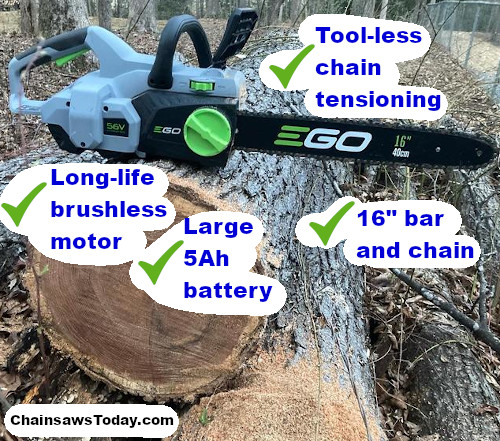
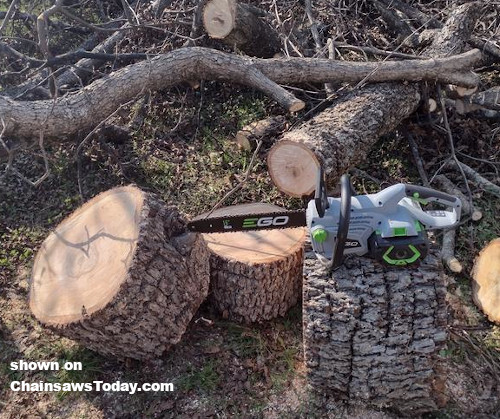

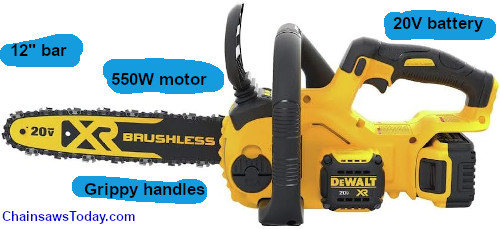
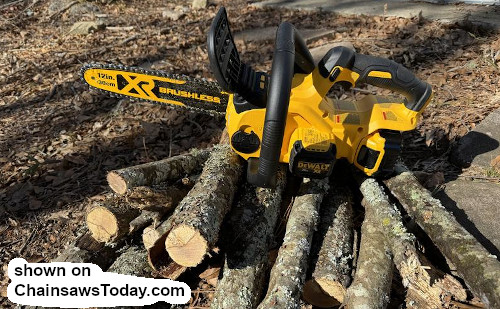
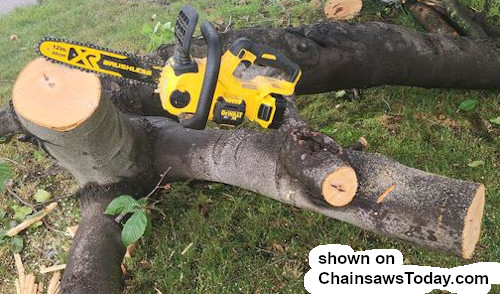
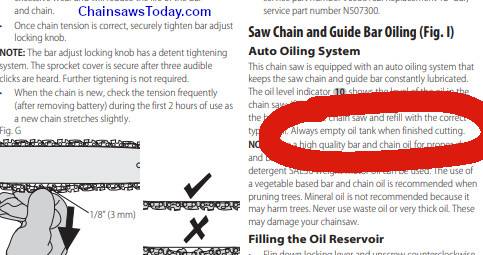
 That’s what I tell myself every time I do something risky.
That’s what I tell myself every time I do something risky.
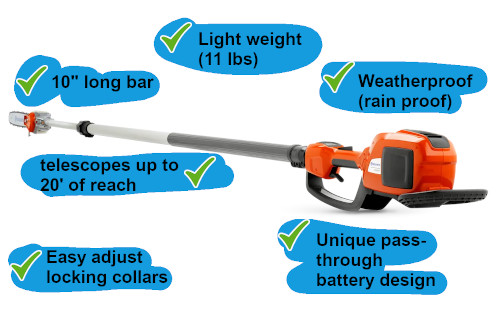

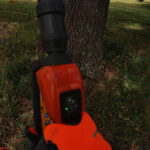
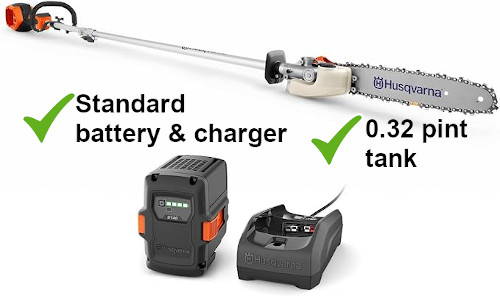
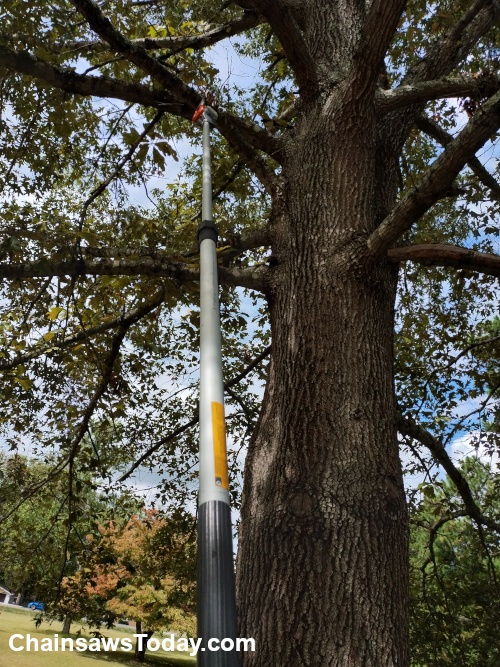
 If you’re a regular reader of ChainsawsToday, you know I love getting my hands on various chainsaws and trying them out.
If you’re a regular reader of ChainsawsToday, you know I love getting my hands on various chainsaws and trying them out.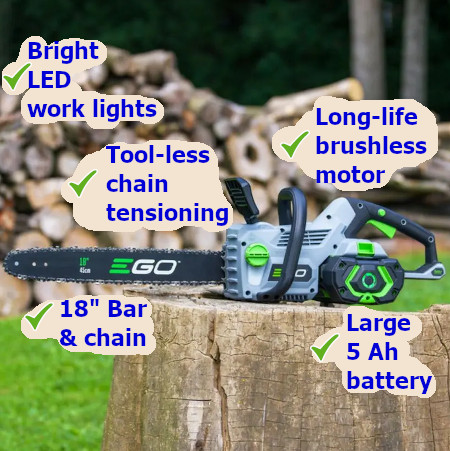
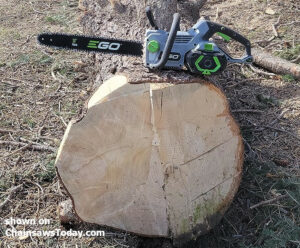
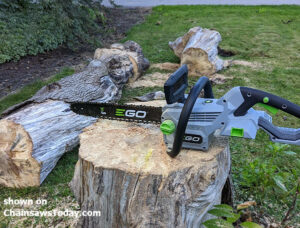
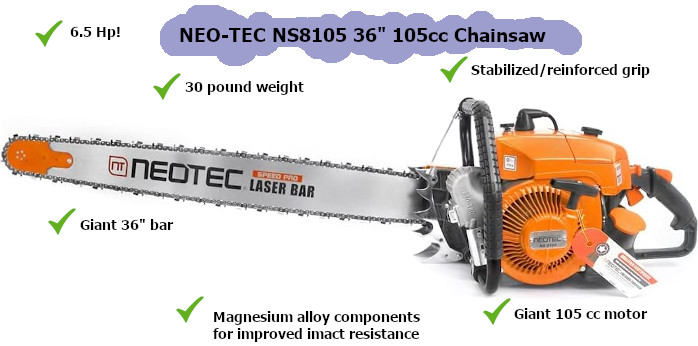
 Right out of the box, this thing started right up and gave me no issues cutting.
Right out of the box, this thing started right up and gave me no issues cutting.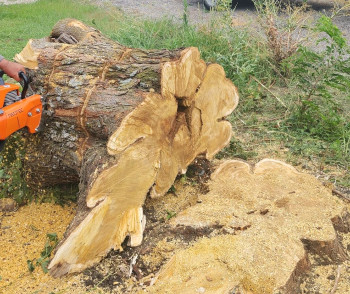
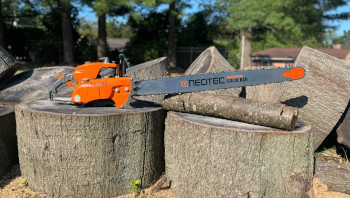

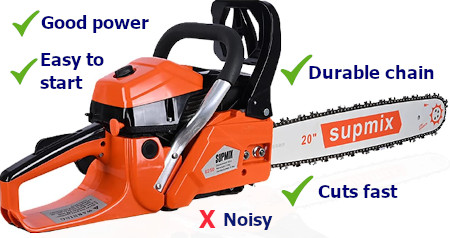
 This thing starts easily. I have heard some folks complaining about getting it started, but I often wonder if those are people that complain about starting all saws. I had no trouble hot or cold, a few pulls of the cord and it was rip-roaring.
This thing starts easily. I have heard some folks complaining about getting it started, but I often wonder if those are people that complain about starting all saws. I had no trouble hot or cold, a few pulls of the cord and it was rip-roaring.
